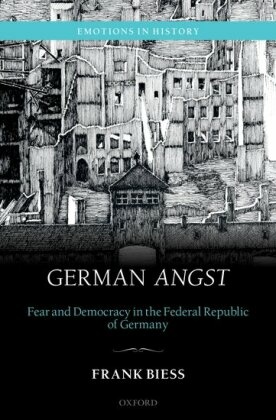
German Angst - Fear and Democracy in the Federal Republic of Germany
| Verlag | Oxford University Press |
| Auflage | 2022 |
| Seiten | 432 |
| Format | 15,5 x 2,4 x 23,3 cm |
| Print PDF | |
| Gewicht | 634 g |
| Artikeltyp | Englisches Buch |
| Reihe | Emotions in History |
| EAN | 9780192867872 |
| Bestell-Nr | 19286787EA |
While fear and anxiety have historically been associated with authoritarian regimes, Frank Biess demonstrates the ambivalent role of these emotions in the democratization of West Germany, where fears and anxieties about the country's catastrophic past and uncertain future both undermined democracy and stabilized the emerging Federal Republic.
German Angst analyses the relationship between fear and democracy in postwar West Germany. While fear and anxiety have historically been associated with authoritarian regimes, Frank Biess demonstrates the ambivalent role of these emotions in a democratizing society: in West Germany, fear and anxiety both undermined democracy and stabilized it. By taking seriously postwar Germans' uncertainties about the future, this study challenges dominant linear and teleological narratives of postwar West German 'success', highlighting the prospective function of memories of war, National Socialism, and the Holocaust. Postwar Germans projected fears and anxieties that they derived from memories of a catastrophic past into the future.
Based on case studies from the 1940s to the present, German Angst provides a new interpretive synthesis of the Federal Republic. It tells the history of the Federal Republic as a series of cyclical crises in which specific fears and anxieties emerged, served a variety of political functions, and then again abated. Drawing on recent interdisciplinary insights generated by the field of emotion studies, Biess's study transcends the dichotomy of 'reason' and 'emotion'. Fear and anxiety were not exclusively irrational and dysfunctional, but served important roles in postwar democracy. These emotions sensitized postwar Germans to the dangers of an authoritarian transformation, and they also served as emotional engines of new social movements, including the environmental and peace movements. German Angst also provides an original analysis of the emotional basis of right-wing populism in Germany today, and it explores the possibilities of a democratic politics of emotion.
Inhaltsverzeichnis:
Preface
Introduction: Fear and Democracy
1: Postwar Angst
2: Moral Angst
3: Cold War Angst
4: Modern Angst
5: Democratic Angst
6: Revolutionary Angst
7: Proliferating Angst
8: Apocalyptic Angst
9: German Angst
Conclusion
Acknowledgements
Primary Sources
Bibliography
Rezension:
Winner of the 2021 Norris and Carol Hundley Award of the Pacifc Coast Branch of the American Historical Association
